Login or Subscribe
You must be logged in to access this content
Subscribe for free access to Japanese Exotic Mushroom Journal and gain insider knowledge on effective cultivation methods for Japanese mushroom species. Elevate your skills with expert tips and innovative technologies to master the art of growing Japanese exotic mushrooms.
◆ Discover exclusive Japanese mushroom cultivation techniques
◆ Learn innovative methods to enhance mushroom quality and yield
◆ Tap into Japan's rich heritage for unique growing insights
◆ Discover exclusive Japanese mushroom cultivation techniques
◆ Learn innovative methods to enhance mushroom quality and yield
◆ Tap into Japan's rich heritage for unique growing insights
Subscribe Now for Free Login
Meet the Growers
Sun S Farm - A major shiitake hub in Nagasaki Prefecture
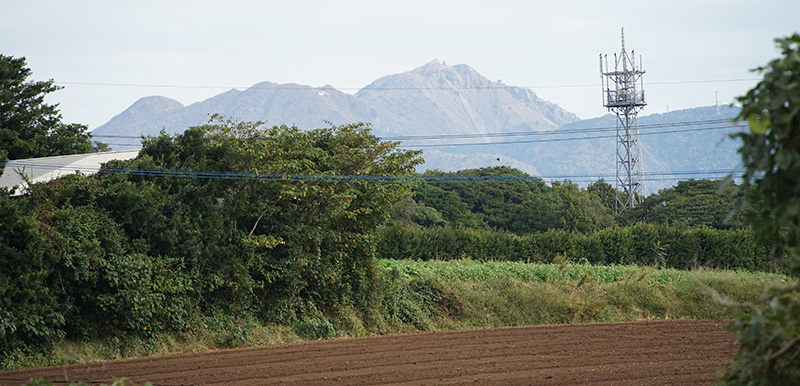
- Sun S Farm mixed stunning panoramas with expansive rolling hills of rich farmland.
- Nagasaki Prefecture has an unexpectedly strong mushroom sector for a region that did not traditionally eat many mushrooms and was also not, like Oita, Kumamoto or Tokushima Prefectures, a traditional center of tree log-base shiitake cultivation. In November of 2024, I unexpectedly ended up in Nagasaki’s Unzen Peninsula for the second time that year, touring another major mushroom producer, this time a unique shiitake farm called Sun S Farm. Sun S Farm produces approximately 400 metric tons of fresh shiitake each year on a plot of land just over a hectare and with just upwards of 50 employees. The farm sells locally, but also ships and markets its product in other regions of Japan, including Tokyo.I arrived on a cool autumn morning, together with an industry connection who had made the appointment for a tour. Located on a small hilltop amidst the gently rolling foothills of the infamous volcano, Mt. Unzen, San S Farm has an idyllic panoramic view of the back side of the volcano. Surrounded by agricultural fields and forests, and using only natural spring water that filters through the volcanic rock into underground aquifers, San S makes its clean natural location, excellent water, and use of Kyushu-produced (the southernmost of Japan’s four major islands and where Nagasaki Prefecture is) wood chips supplemented generously with nutritional supplements, a key part of its branding. The farm targets thick, flavorful shiitake of a high standard quality, while making efficient use of their space and all materials that go into the growing process.One thing that definitely impressed me from the moment I got out of the car and walked through the entrance to the farm was how clean and new everything was. Sun S Farm has been operating for decades now, but the farm has kept its facilities up-to-date, with an especially impressive employee breakroom/lunch room, with the packaging room beneath it on the first floor, and solid-looking steel warehouses for fruiting and incubation.Soon after arriving, I met the son of the farm’s founder and its next managing director, Kanta Nagahashi. To distinguish him from his father, everyone called him by his first name, Kanta, which is relatively rare in Japan in my experience. To me, going by just Kanta lent a certain degree of informality. Kanta’s laid-back attitude added to the impression as he personally led us through a tour of the farm.As always, I started the tour by making a beeline for the sawdust substrate and, with permission of course, started digging around in it. I like to see whether a farm is using partially fermented or actively fermenting sawdust or not by feeling for the heat generated, and I like to get a good feel for the heterogeneity of the sawdust/wood chip grains, also looking at what the average size is. Sun S Farm, like all other Kyushu farms I have been to that use wood-based substrate, uses a wood chip base.The wood chips in Sun S Farm’s substrate were on average small, with a wide degree of size variation. One thing I noted_emdash_which of course does not mean much when I am talking about a few handfuls taken from a five-ton pile of wood chips_emdash_was a very flakey consistency with lots of thin, wide chips. The substrate was also not fermenting or undergoing any kind of fermentation at all, but was instead very raw and very fresh. This contrasted with my experience with shiitake farms on the main island of Honshu, which have all used sawdust and typically have some degree of fermentation going on in their substrate, even during cold winter days.
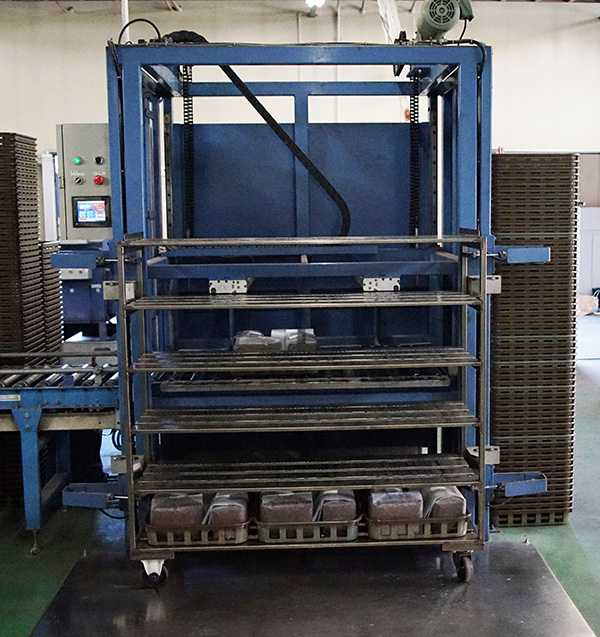
- An automated shelving machine. They are growing more common in Japan, where labor shortages are an issue for farms.
- To the left of the woodchip piles (which the farm completely cycles every 3~4 days in accordance with shipments), was the mixer and bagging stations. Two workers were busily folding bags of substrate as they came off the line, and placing them in on trays along a conveyer belt. The unique thing about Sun S, which I have not seen very often in Japan, is its automatic shelving machine, which pushes three sets of trays, each with four 2.5 kilo M-sized bags of substrate, on shelves. Kanta informed me that just the next week the farm was installing machinery to do the folding and placement of the filled bags in the tray, which would further streamline the station.We talked briefly about supplementation before moving on. Like many farms in Japan, Sun S use a special supplementation mix designed for their spawn variety and sold to them by their spawn maker, and which even they do not know the contents of. But they also add additional wheat and rice bran to supplement the blocks, and a small amount of ash from the shiitake blocks they incinerate in their biomass broiler.The most interesting point about Sun S Farm, and the point which both my industry connection and Kanta assured me was completely unique to Sun S, was the incubation room. The farm stacks pallets of incubating shiitake blocks three pallets high, and does the entire incubation, both stage one and stage two, in the same room. This minimizes handling and makes the most efficient use of their space. However, it also requires special, high powered humidifying systems that shoot jets of fog up from the floor.Standing beside the equivalent of a two-story building’s worth of stacked shelves of incubating shiitake is overwhelming. The scene was, more importantly, very difficult to capture with a camera because the height-width ratio was so wide. I had to back up all the way to the entrance, squat close to the wet floors, and angle the camera up slightly just to capture an entire stack from top to bottom, with the unfortunate effect that this diminished the size factor. Billowing fog and dim lighting, as always, made it a real challenge to take crisp, clear photos of mushroom incubation.I ended up being even more fascinated by another aspect of Sun S’s incubation process than the three-tier stack. Typically, Japanese shiitake farmers split the first and second incubation stages of shiitake substrate blocks into different rooms. The initial mycelial spread, then the browning process have, or so Japanese cultivation guides say, delicate and differing needs that makes it better to run them separately. Sun S did everything in the same room, with one big twist.As the second phase of incubation began, Sun S flips the blocks of shiitake on their sides. Kanta showed me several bags and explained to me that the fluid draining down to the edge of the bag was not water, but primarily consisted of metabolic byproducts (shiitake poop, he jokingly called it). Kanta claimed that the browning process went smoother and the quality of the harvested mushroom was superior by flipping the bags and letting these metabolites drain out of the substrate. Removing this fluid also, he suggested, allows the mycelium to “breathe” better, so that the farm has no issues doing the second, browning phase of incubation even in a room with elevated CO2 levels.
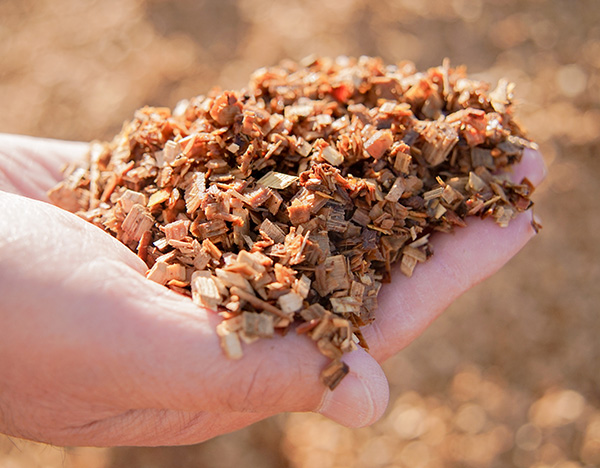
- Kanta also said running the entire incubation on standardized settings, contrary to what a lot of cultivation guides say, has not had much of an apparent impact. Spawn variety and their substrate recipe itself play some role in this, but on the whole, he said that the second stage of shiitake incubation was not as sensitive as the literature suggests. I found the extreme efficiency of the system exceptional, as the farm had just one incubation room and produced upwards of 400 metric tons of shiitake a year using this one incubation room.However, the uniqueness of Sun S Farm was not finished with the incubation room. Sun S harvests only two flushes and settles for between 700~750 grams of yield per 2.5-kilogram substrate block. I have never known a large shiitake farm in Japan to harvest fewer than three flushes. One large farm in Tohoku harvested either four or five flushes per block and that farm’s owner explained his logic by saying that as long as the yield per block exceeded 50 grams, he was breaking even on labor costs for a picker.Sun S Farm aims for a better average quality on a smaller harvest, saving on the labor of prepping shiitake for a second flush. The process of removing shiitakes from a shelf, placing them in containers and soaking them in water for 6~12 hours, then taking them out and placing them back on shelves and returning them to fruiting rooms, is, as should be obvious from the description, very labor intensive. For a farm operating on just a little over 1 hectare, the space constraints add a large opportunity cost onto the labor costs.I suspect that there are other practical reasons behind the decision to only do two flushes. The more flushes done, the higher the ash content of the remaining block is. Sun S Farm has yet another unique and rare set up on its farm: it dries then burns its spent shiitake blocks in a biomass broiler, using logs and kindling where needed. If the ash content of the blocks was too high from too many flushes the farm would have more difficulties running such a broiler and get less energy return.The biomass broiler, the first I have seen in person, was quite impressive. A huge trailer filled with spent shiitake blocks connected to the flaring broiler, and drill-like tubes ground the blocks and fed the broiler continuously. Sun S Farm uses its own spent shiitake blocks to power this broiler, which heats water and powers the heating system used in its incubation and fruiting rooms. With this system, Sun S farm sacrifices a third flush of maybe 120~150 grams per block, but drastically reduces its energy costs.
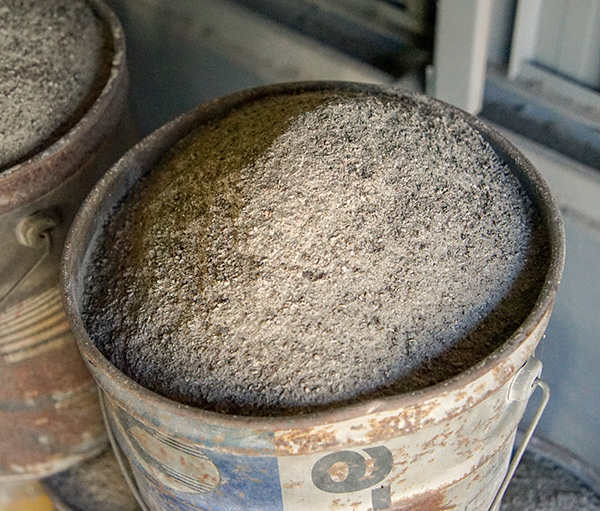
- Sun S Farm was the first I have seen to use wood ash as a supplement. This increases alkalinity.
- I was making various cost-benefit analyses in my head as I inspected the broiler and took pictures. The result? I felt a tinge of disbelief and irritation that more farms in Japan have not adapted to this kind of system. Farms could get rid of a third flush, where the labor efficiency of the yield is low, and drastically reduce their energy costs while also making disposal of spent substrate simpler (by reducing the volume and weight to a fraction of the initial starting points, and using a portion of it as a pH regulator in the next batches of substrate).However, a simple on the spot cost-benefit analysis never captures anything. In this case, I am again reminded of how mushroom farming is something that, like mushrooms themselves, is endlessly variable and adapts and takes on different forms depending on its environment (its substrate). Kyushu is further south and warmer, and evergreen oak tree varieties and similar deciduous trees are much more common. Sawdust or wood chips for high-performing oak varieties are affordable and widely available from many different local providers.In northern and central Honshu, (Japan’s biggest island), the temperatures are cooler, winters longer and snowier, and because of historical logging patterns, most of the forests are coniferous. In particular, after massive deforestation up to the 1950s, many mountains and foothills throughout Honshu were replanted with fast-growing coniferous trees like Japanese larch, Japanese cedar, or Japanese cypress. The 2011 Fukushima Nuclear Plant meltdown, in addition to all the other tragedies of that earthquake and disaster, irradiated much of the largest deciduous sawdust producing region of Honshu, one that was geared for mushroom producers.As a result, mushroom farmers in Honshu are dealing with high prices and struggling to fill their demands. The costs of shipping across the country mean that they cannot rely on the same cheap, readily available sources of oak sawdust that farmers in Kyushu enjoy. This, I suspect, plays a role in why shiitake farmers in northern Japan especially have to endure the low efficiency of 3, or 4 flushes, and even use a system called the “top-fruiting method” where only the top of the bag is cut off and blocks are fruited from the top only for a course of 6~8 flushes. Fuel prices are also generally higher in northern Japan, which has fewer refineries and less heavy industry, than they are in Kyushu. The effect is that farmers have much higher input costs for blocks, which ties their hands.
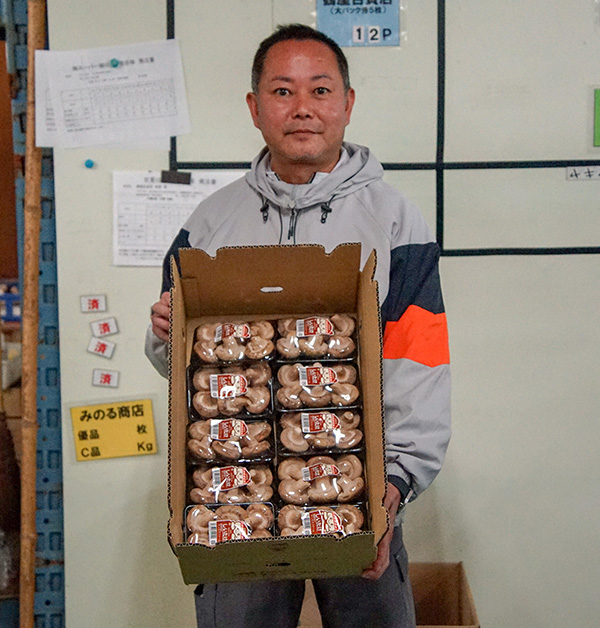
- Kanta posing with a box of shiitake.
- I make this little aside simply to explain how every decision on a farm, including something that seemingly has only pluses like a biomass broiler, is at the mercy of broader market forces.After looking at the biomass broiler, all that was left of the farm tour was to walk through the packaging room. Sun S Farm favors a very light-colored, well-shaped shiitake. While the average size was not very large, I saw great consistency in cap size and shape, and the farm did a good job processing and packaging shiitake in a timely manner so that the caps were not opened. I also noticed that, while the average size was more of a medium grade, Sun S Farm’s shiitake had thick, solid caps, which really impressed me considering how many thin or scrawny caps I see with artificially cultivated shiitake even in Japan.
The Café and Gift shop
Sun S Farm has one other thing that I have never seen at a Japanese mushroom farm: an on-site shiitake-themed café and a gift shop, selling their homemade shiitake chips, dried shiitake, shiitake powder, and other local specialty products. Sun S Farm even runs study tours and shiitake picking tours of its farms, both for tourists and for local residents_emdash_including special events planned for schoolchildren.The two of us each received a full shiitake lunch set, all made with shiitake harvested that morning. It included crisp, flavorful shiitake tempura sprinkled with sea salt, a shiitake potage soup so creamy, so packed with umami that I could only eat each spoonful with great slowness, feeling my chest bubble up with warmth and good feelings, and a shiitake pita bread wrap made with one slow-roasted and marinated, jumbo shiitake as the centerpiece. All in all, I must have eaten about 200 grams worth of shiitake in single meal, which is really saying something considering I only eat about 2 kilograms of shiitake in an entire year.Even the drink, a tart, citrusy orange juice made by local, Nagasaki citrus farmers and never frozen or reduced to concentrate, was phenomenal, and the tart sourness the perfect contrast and aperitif for the rich umami-laden flavor of the shiitake set. After lunch, I ended up getting an ice cream cone, sprinkled with roasted shiitake powder and crispy roasted shiitake chip attached, and was shocked at how unexpectedly well shiitake paired with the sweet, creamy dessert.The café has a small interior, so there are additional seats and benches on a slight ridge that runs beside the building and the road. There, in the shade of trees and with a view of scenic Mt. Unzen in the distance, people can see and enjoy fresh shiitake cuisine. The main customer base is from tour groups and people booking tours or harvesting experiences at the farm, so the café tends to move in bursts and use all the extra seating.Pumped up on amazing food, and still trying to categorize and properly memorize all of my impressions from the tour, I could not escape a certain giddy respect. Sun S Farm reaffirmed my growing impression of Kyushu as a true center of innovation in the Japanese economy. Here, mushroom farms are willing to be weird and different. They find ways to cut costs and improve efficiency, break with cultivation manuals where they can, and focus on branding themselves and improving quality over trying to churn ever greater volumes at whatever low prices they need to in order to sell those quantities.I appreciated the clean, modern farm, that made basic investments in upkeeping facilities, including having a decent, modern bathroom (which can be rare on a Japanese mushroom farm). The orderliness of the farm was proof of a well-run and well-oiled operation, and competence from top to bottom, something I additionally saw in the good quality and enormous consistency of the harvested product. What is more, even in the busiest part of the year, the work-flow was moving at a sustainable flow, and neither the pickers, nor packers, were stressed or being buried under mountains of ever-accumulating work from lack of labor, and the leadership, represented by Kanta, also retained a suave and unstressed confidence.Sun S Farm, and other mushroom farms in Kyushu that are all, every single one I have been to, experimenting with their own highly unique and productive systems and to great success, would make a great place to study the mushroom industry. I hope in the future that some of this journal’s readers and others working in the specialty/exotic mushroom sector will join us on a mushroom tour of some these Kyushu producers sometime in the future, and that then, I will get the opportunity to go back to Sun S Farm again and have another shiitake ice cream. 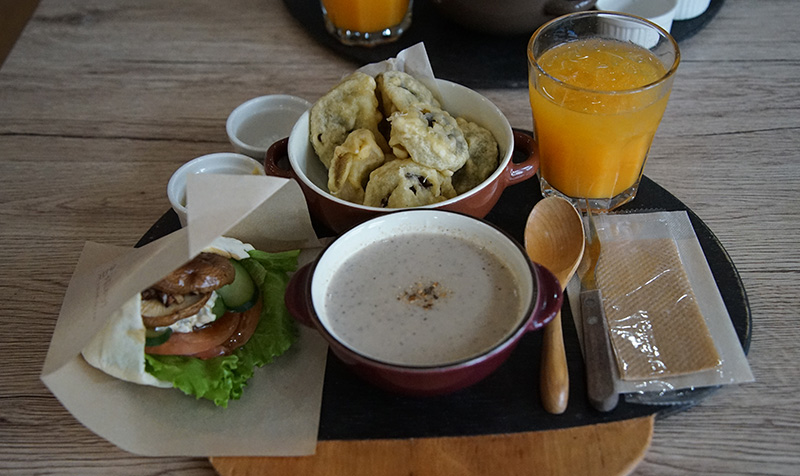
- The shiitake lunch set at Sun S Farms.

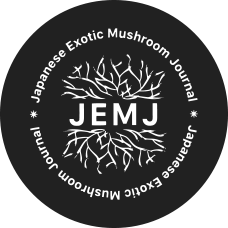



 1-2-13 Honmachi, Komoro city, Nagano prefecture, Japan 384-0026
1-2-13 Honmachi, Komoro city, Nagano prefecture, Japan 384-0026